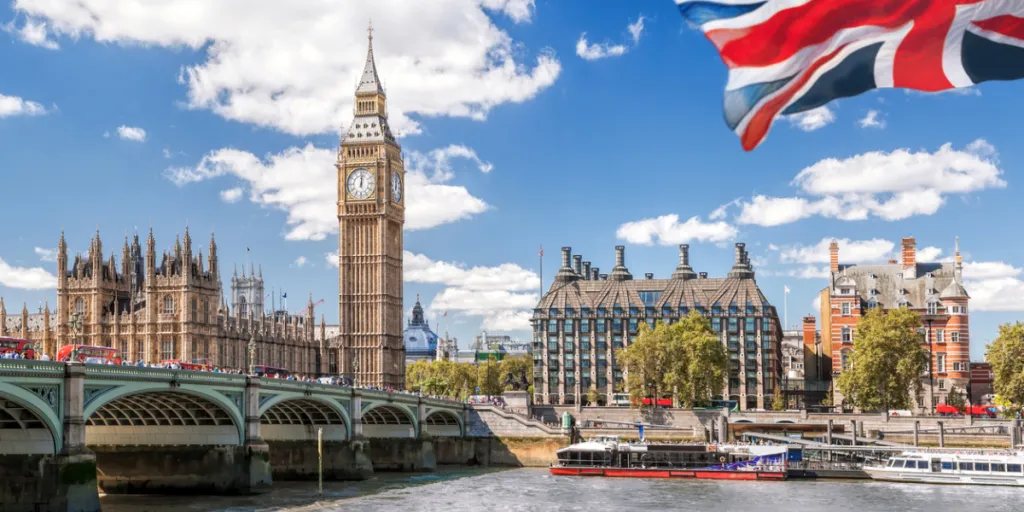Table of Contents
Corporate Travel Services in the UK
Chemical & Fertiliser Mineral Mining in the UK
Sea & Coastal Passenger Water Transport in the UK
Scheduled Passenger Air Transport in the UK
Non-Scheduled Passenger Air Transport in the UK
Solar Panel Installation in the UK
Budget Airlines in the UK
Nightclubs in the UK
Gas Supply in the UK
Urban Passenger Rail Operations in the UK
1. Corporate Travel Services in the UK
2023-2024 Revenue Growth: 95.3%
Interest in corporate travel deals is sensitive to business confidence. A poor economic situation and multiple shocks like the pandemic and Brexit have contributed to the contracting revenue for agencies. Demand for travel services is also influenced by the cost of travel, which has risen due to the low value of the pound and rising prices. However, the pandemic was the most significant factor contributing to the fall in revenue. Travel restrictions domestically and internationally during the pandemic caused the industry to come to a standstill, which it has struggled to recover from.
2. Chemical & Fertiliser Mineral Mining in the UK
2023-2024 Revenue Growth: 80.0%
The Chemical and Fertiliser Mineral Mining industry has been subject to volatile conditions over the past five years. The industry transitioned to the production of polyhalite, which led to a substantial reduction in potash prices and significant revenue decline for much of the past five years. However, production of polyhalite in 2018 has given the industry a new lease of life. Cleveland Potash Ltd, the largest firm in the industry, has transitioned into a polyhalite-only mining business. Industry players were able to continue production despite the COVID-19 (coronavirus) outbreak.
3. Sea & Coastal Passenger Water Transport in the UK
2023-2024 Revenue Growth: 79.5%
The Sea and Coastal Passenger Water Transport industry offers a range of services, including cruises, ferry services and fishing charters. The industry is therefore reliant on domestic and international tourism. Cruise ships have performed robustly over most of the past five-year period and have expanded by marketing value, such as all-inclusive holidays. However, demand for international ferry services has wavered as a result of intense competition from air and rail transport. Moreover, travel restrictions in response to the COVID-19 (coronavirus) outbreak caused passenger numbers to plummet during 2020-21.
4. Scheduled Passenger Air Transport in the UK
2023-2024 Revenue Growth: 66.9%
Over the five years through 2023-24, scheduled passenger air transport revenue is anticipated to contract at a compound annual rate of 3.6% to £24.1 billion. The COVID-19 outbreak has had a devastating effect on airlines. Strict public health restrictions significantly cut demand for air travel during the first quarter of 2020-21. Despite showing signs of recovery during the second quarter of 2020-21 with the easing of travel restrictions, the re-implementation of domestic and international restrictions spurred a renewed slump in passenger numbers in the latter half of 2020-21.
5. Non-Scheduled Passenger Air Transport in the UK
2023-2024 Revenue Growth: 64.4%
Over the five years through 2023-24, non-scheduled passenger air transport revenue is anticipated to decline at a compound annual rate of 3.5% to £3 billion. The industry has exhibited a poor performance owing to weak consumer and business demand. Although the industry may be perceived as providing tailored travel services for the wealthy, the bulk of revenue is generated by transporting customers to holiday destinations as part of a travel package. Revenue has fluctuated significantly, largely because of the COVID-19 outbreak.
6. Solar Panel Installation in the UK
2023-2024 Revenue Growth: 59.2%
The UK solar market has exploded over the past 15 years, with more than 14,000 megawatts of capacity installed in 2022, a huge jump from less than 15 megawatts in 2007. The majority of this growth occurred prior to cuts to government incentives in January 2016, though renewed government support has driven an uptick in installations over the last couple of years. Variations in the level of government support for solar power have spurred significant volatility for solar panel installers.
7. Budget Airlines in the UK
2023-2024 Revenue Growth: 58.1%
The Budget Airlines industry has benefitted from consumers increasingly seeking value for money. The industry is highly concentrated, consisting of only four airlines. External factors, including business and consumer confidence, household disposable income, and outbound and international tourist numbers, determine demand for budget airlines. Shocks like natural disasters, terrorist attacks and disease outbreaks also affect demand. Revenue is expected to rise at a compound annual rate of 0.3% over the five years through 2023-24 to £10.1 billion.
8. Nightclubs in the UK
2023-2024 Revenue Growth: 56.5%
Spending on clubs reflects disposable income levels, with Britons generally spending less on clubbing during periods of rising inflation as everything gets more expensive. The COVID-19 outbreak, the cost-of-living crisis, and falling levels of alcohol consumption are all threatening the performance of nightclubs. Industry revenue is expected to fall at a compound annual rate of 7.5% over the five years through 2023-24 to approximately £1.6 billion, including growth of 0.8% in 2023-24.
9. Gas Supply in the UK
2023-2024 Revenue Growth: 42.4%
Operators in the Gas Supply industry purchase gas from the wholesale market and sell it to end users via the distribution network. Industry regulator Ofgem encouraged greater competition in the industry, leading to a rapid rise in the market share of independent suppliers in the first half of the period, culminating in the effective break-up of the former Big Six energy suppliers in January 2020, following OVO Energy’s acquisition of SSE’s domestic customer book. However, record-high wholesale prices reversed the upward trend in market participation in 2021-22, forcing 30 suppliers out of the industry.
10. Urban Passenger Rail Operations in the UK
2023-2024 Revenue Growth: 40.2%
Over the five years through 2022-23, revenue is expected to contract at a compound annual rate of 1.7% to £3.7 billion. COVID-19 disruptions decimated urban rail traffic, driving this revenue loss. London is the largest market for urban rail services, accounting for more than 90% of passengers. Consequently, Transport for London (TfL) dominates the industry through its ownership of the London Underground, the Docklands Light Railway and the London Overground. Industry performance is predominately contingent on the number of passengers using these services, which is determined by several demographic and social factors.
Source from IBISWorld
Disclaimer: The information set forth above is provided by IBISWorld independently of Alibaba.com. Alibaba.com makes no representation and warranties as to the quality and reliability of the seller and products.




